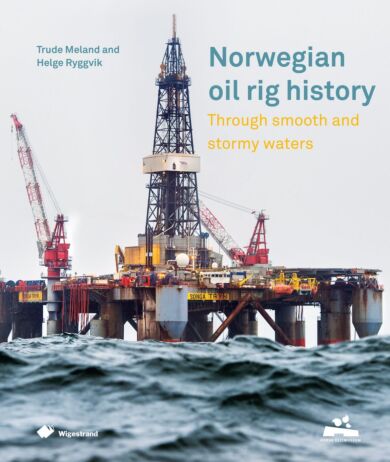Norwegian oil rig history
through smooth and stormy waters
- Format: Innbundet
- Antall sider: 417
- Språk: Engelsk
- Forlag/Utgiver: Wigestrand Forlag
- Nivå: Voksen
- EAN: 9788281402799
- Kom i salg: 11. okt. 2024
- Utgivelsesår: 2024
- Tittel på originalspråk: Norsk rigghistorie
- Bidragsyter: Meland, Trude (for) ; Ryggvik, Helge (for) ; Gooderham, Rolf E. (ove)
- Emnekategori: Europeisk historie, Industrialisering og industrihistorie
495,-
The history of Norway¿s rig sector is a tale of how a strong Norwegian maritime traditions helped, through boldness, commitment, misjudgements and groundbreaking technology, to shape the most demanding segment in the oil industry ¿ drilling in the world¿s roughest seas.
This story begins with the American rigs which appeared on the Norwegian continental shelf in the mid-1960s. Over time, the interaction between owners dominated by a risk-tolerant shipowning class, personnel who made demands and Norwegian engineers and fabricators made rigs from Norway into the standard which others measured themselves against.
No other part of the Norwegian oil industry has had to contend to the same extent with the physical elements ¿ storms, wild seas and huge sub-surface pressures. This book describes dramatic disasters and losses, alongside a massive commitment to enhancing safety.
Considerable financial risks have also been faced. This history is characterised by violent fluctuations reflected in the wealth of companies and a constant struggle for hegemony. Attention is paid not only to technology and companies, but also to individuals who have played key roles.
Take a voyage through boom and bust in an industry which has been crucial for Norway¿s position as an oil and gas nation.
Trude Meland (b 1971) is a researcher at the Norwegian Petroleum Museum in Stavanger. Holding an MSc in politics from the University of Bergen, majoring in history, she works on various topics related to Norway¿s oil history with the emphasis on working conditions and safety. Meland has participated in a number of documentation, research and exhibition projects at the museum.
Helge Ryggvik (b 1960) is a historian and researcher at the Centre for Technology, Innovation and Culture (TIK) at the University of Oslo. The oil industry has been a recurring theme in his research and the books he has written on such topics as company history, safety, the environment, labour relations, diving and technology development. He has also written on Norway¿s railways.
Translator Rolf E Gooderham (b 1946) is half-Norwegian but was born and educated in the UK. He studied Scandinavian politics at university and has devoted more than 50 years to writing about Norway in English as a journalist, editor and translator. Gooderham¿s principal focus has been on the oil and shipping industries, but there are few areas of the Norwegian economy he has not covered. He has translated over 40 books and book-length websites.
This story begins with the American rigs which appeared on the Norwegian continental shelf in the mid-1960s. Over time, the interaction between owners dominated by a risk-tolerant shipowning class, personnel who made demands and Norwegian engineers and fabricators made rigs from Norway into the standard which others measured themselves against.
No other part of the Norwegian oil industry has had to contend to the same extent with the physical elements ¿ storms, wild seas and huge sub-surface pressures. This book describes dramatic disasters and losses, alongside a massive commitment to enhancing safety.
Considerable financial risks have also been faced. This history is characterised by violent fluctuations reflected in the wealth of companies and a constant struggle for hegemony. Attention is paid not only to technology and companies, but also to individuals who have played key roles.
Take a voyage through boom and bust in an industry which has been crucial for Norway¿s position as an oil and gas nation.
Trude Meland (b 1971) is a researcher at the Norwegian Petroleum Museum in Stavanger. Holding an MSc in politics from the University of Bergen, majoring in history, she works on various topics related to Norway¿s oil history with the emphasis on working conditions and safety. Meland has participated in a number of documentation, research and exhibition projects at the museum.
Helge Ryggvik (b 1960) is a historian and researcher at the Centre for Technology, Innovation and Culture (TIK) at the University of Oslo. The oil industry has been a recurring theme in his research and the books he has written on such topics as company history, safety, the environment, labour relations, diving and technology development. He has also written on Norway¿s railways.
Translator Rolf E Gooderham (b 1946) is half-Norwegian but was born and educated in the UK. He studied Scandinavian politics at university and has devoted more than 50 years to writing about Norway in English as a journalist, editor and translator. Gooderham¿s principal focus has been on the oil and shipping industries, but there are few areas of the Norwegian economy he has not covered. He has translated over 40 books and book-length websites.


